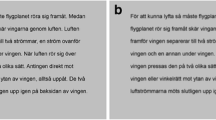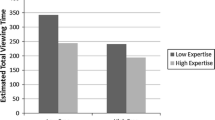Abstract
In the present study, primary school children’s ability to give accurate confidence judgments (CJ) was addressed, with a special focus on uncertainty monitoring. In order to investigate the effects of memory retrieval processes on monitoring judgments, item difficulty in a vocabulary learning task (Japanese symbols) was manipulated. Moreover, as a first exploratory step to uncover fast and retrieval bound (implicit) monitoring processes that take place before explicit CJ are openly reported, fixation time allocation during recognition and monitoring was recorded with an eye-tracking device. Results revealed developmental progression in uncertainty (but not in certainty) monitoring between the age of 7 and 9 years. Differences in CJ across levels of item difficulty point to a substantial impact of retrieval processes on 9-yr-olds’ but not on 7-yr-olds’ monitoring. Eye-tracking data revealed an overall bias towards medium and high CJ, and confirmed evidence on developmental progression in monitoring skills.



Similar content being viewed by others
Notes
Other measures of implicit CJ were calculated as well (e.g., the last fixation on a confidence judgment before the explicit judgment was given during recording). These analyses revealed the same or very similar results.
References
Arbuthnott, K. D., Kealy, K. L. K., & Ylioja, S. (2008). Judgement of confidence in childhood memories. Applied Cognitive Psychology, 22, 953–978.
Aslin, R. N., & McMurray, B. (2004). Automated corneal-reflection eye-tracking in infancy: methodological developments and applications to cognition. Infancy, 6, 155–163.
Baillargeon, R. (1987). Object permanence in 3 1/2- and 4 1/2-month-old infants. Developmental Psychology, 23, 655–664.
Clements, W. A., & Perner, J. (1994). Implicit understanding of belief. Cognitive Development, 9, 377–395.
Corbetta, M. (1998). Frontoparietal cortical networks for directing attention and the eye to visual locations: Identical, independent, or overlapping neural systems? Proceedings of the National Academy of Sciences, USA, 95, 831–838.
Dunlosky, J., & Bjork, R. A. (2008). The integrated nature of metamemory and memory. In J. Dunlosky & R. A. Bjork (Eds.), Handbook of metamemory and memory (pp. 11–28). New York: Psychology.
Dunlosky, J., Hertzog, C., Kennedy, M. R. F., & Thiede, K. W. (2005). The self-monitoring approach for effective learning. International Journal of Cognitive Technology, 10, 4–11.
Eriksen, B. A., & Eriksen, C. W. (1974). Effects of noise letters upon the identification of a target letter in a nonsearch task. Perception and Psychophysics, 16, 143–149.
Flavell, J. H., & Wellman, H. M. (1977). Metamemory. In R. V. Kail & J. W. Hagen (Eds.), Perspectives on the development of memory and cognition (pp. 3–34). Hillsdale: Lawrence Erlbaum Associates.
Hauland, G. (2003). Measuring team situation awareness by means of eye movement data. In Proceedings of HCI International 2003: Vol. 3 (pp. 230–234). Mahwah, NJ: Lawrence Erlbaum Associates.
Hayhoe, M. M. (2004). Advances in relating eye movements and cognition. Infancy, 6, 267–274.
Hayhoe, M. M., Bensinger, D. G., & Ballard, D. H. (1998). Task constraints in visual working memory. Vision Research, 38, 125–137.
Henderson, J. M., & Hollingworth, A. (1998). Eye movements during scene viewing: An overview. In G. Underwood (Ed.), Eye guidance in reading and scene perception (pp. 269–293). Oxford: Elsevier.
Howie, P., & Roebers, C. M. (2007). Developmental progression in the confidence-accuracy relationship in event recall: Insights provided by a calibration perspective. Applied Cognitive Psychology, 21, 871–893.
Karatekin, C. (2004). Development of attentional allocation in the dual task paradigm. International Journal of Psychophysiology, 52, 7–21.
Karatekin, C. (2007). Eye tracking studies of normative and atypical development. Developmental Review, 27, 283–348.
Kelley, C. M., & Jacoby, L. L. (1996). Memory attributions: Remembering, knowing, and feeling of knowing. In L. M. Reder (Ed.), Implicit memory and metacognition (pp. 287–308). Hillsdale: Erlbaum.
Kinnunen, R., & Vauras, M. (1995). Comprehension monitoring and the level of comprehension in high- and low-achieving primary school children’s reading. Learning and Instruction, 5, 143–165.
Kinnunen, R., Vauras, M., & Niemi, P. (1998). Comprehension monitoring in beginning readers. Scientific Studies of Reading, 2, 353–374.
Koriat, A. (1993). How do we know that we know? The accessibility model of the feeling of knowing. Psychological Review, 100, 609–639.
Koriat, A. (1995). Dissociating knowing and the feeling of knowing: further evidence for the accessibility model. Journal of Experimental Psychology: General, 124, 311–333.
Koriat, A. (1997). Monitoring one’s own knowledge during study: a cue-utilization approach to judgments of learning. Journal of Experimental Psychology: General, 126, 349–370.
Koriat, A. (1998). Metamemory: The feeling of knowing and its vagaries. In M. Sabourin, F. Craik, & M. Robert (Eds.), Advances in psychological science, vol. 2: Biological and cognitive aspects (pp. 461–479). Hove: Psychology Press/Erlbaum (UK) Taylor & Francis.
Koriat, A. (2000). The feeling of knowing: Some metatheoretical implications for consciousness and control. Consciousness and Cognition, 9, 149–171.
Koriat, A. (2007). Metacognition and consciousness. In P. D. Zelazo, M. Moscovitch, & E. Thompson (Eds.), Cambridge handbook of consciousness (pp. 289–325). New York: Cambridge University Press.
Koriat, A. (2008). Subjective confidence in one’s answers: the consensuality principle. Journal of Experimental Psychology: Learning, Memory, and Cognition, 34, 945–959.
Koriat, A., & Ackerman, R. (2010). Choice latency as a cue for children’s subjective confidence in the correctness of their answers. Developmental Science, 13, 441–453.
Koriat, A., & Shitzer-Reichert, R. (2002). Metacognitive judgments and their accuracy: Insights from the processes underlying judgments of learning in children. In M. Izaute, P. Chambres, & P.-J. Marescaux (Eds.), Metacognition: Process, function, and use (pp. 1–17). New York: Kluwer.
Koriat, A., Ackerman, R., Lockl, K., & Schneider, W. (2009). The memorizing-effort heuristic in judgments of learning: a developmental perspective. Journal of Experimental Child Psychology, 102, 265–279.
Körkel, J. (1987). Die Entwicklung von Gedächtnis- und Metagedächtnisleistungen in Abhängigkeit von bereichsspezifischen Vorkenntnissen. Frankfurt: Lang.
Leslie, A. M., & Keeble, S. (1987). Do six-month-old infants perceive causality? Cognition, 25, 265–288.
Lockl, K., & Schneider, W. (2003). Metakognitive Überwachungs- und Selbstkontrollprozesse bei der Lernzeiteinteilung von Kindern. Zeitschrift für Pädagogische Psychologie, 17, 173–183.
Maki, R. H. (1998). Test predictions over text material. In D. J. Hacker, J. Dunlosky, & A. C. Graesser (Eds.), Metacognition in educational theory and practice (pp. 117–144). Mahwah: Lawrence Erlbaum Associates.
Metcalfe, J., & Finn, B. (2008). Familiarity and retrieval processes in delayed judgments of learning. Journal of Experimental Psychology: Learning, Memory, and Cognition, 34, 1084–1097.
Nagy, W. E., & Scott, J. A. (2000). Vocabulary processes. In M. L. Kamil, P. B. Mosenthal, P. D. Pearson, & R. Barr (Eds.), Handbook of reading research ((pp, Vol. III, pp. 269–284). Mahwah: Lawrence Erlbaum Associates.
Nelson, T. O. & Narens, L. (1990). Metamemory: A theoretical framework and some new findings. In G.H. Bower (Ed). The Psychology of Learning and Motivation, 26, 125–173. New York: Academic Press.
Pauen, S. (2002). Evidence for knowledge-based category discrimination in infancy. Child Development, 73, 1016–1033.
Pickering, S., & Gathercole, S. (2001). The working memory test battery for children. London: The Psychological Corporation.
Pillow, B. H. (2002). Children’s and adults’ evaluation of the certainty of deductive inferences, inductive inferences, and guesses. Child Development, 73, 779–792.
Pillow, B. H., & Anderson, K. L. (2006). Children’s awareness of their own certainty and understanding of deduction and guessing. British Journal of Developmental Psychology, 24, 823–849.
Pillow, B. H., Hill, V., Boyce, A., & Stein, C. (2000). Understanding inference as a source of knowledge: children’s ability to evaluate the certainty of deduction, perception, and guessing. Developmental Psychology, 36, 169–179.
Renner, C. H., & Renner, M. J. (2001). But I thought I knew that: using confidence estimation as a debiasing technique to improve classroom performance. Applied Cognitive Psychology, 15, 23–32.
Rhodes, M. G., & Kelley, C. M. (2005). Executive processes, memory accuracy, and memory monitoring: an aging and individual difference analysis. Journal of Memory and Language, 52, 578–594.
Robinson, M. D., Johnson, J. T., & Robertson, D. A. (2000). Process versus content in eyewitness metamemory monitoring. Journal of Experimental Psychology: Applied, 6, 207–221.
Roebers, C. M. (2002). Confidence judgments in children’s and adult’s event recall and suggestibility. Developmental Psychology, 38, 1052–1067.
Roebers, C. M., Howie, P., & Beuscher, E. (2007). Can private reports enhance children’s event recall, lower their suggestibility and foster their metacognitive monitoring compared to face-to-face interviews? Computers in Human Behavior, 23, 749–769.
Roebers, C. M., Schmid, C., & Roderer, T. (2009). Metacognitive monitoring and control processes involved in primary school children’s test performance. British Journal of Educational Psychology, 79, 749–767.
Schacter, D. L. (1987). Implicit memory: history and current status. Journal of Experimental Psychology: Learning, Memory, and Cognition, 13, 501–518.
Scheiter, K., & Van Gog, T. (2009). Using eye tracking in applied research to study and stimulate the processing of information from multi-representational sources. Applied Cognitive Psychology, 23, 1209–1214.
Schneider, W. (1998). Performance prediction in young children: Effects of skill, metacognition and wishful thinking. Developmental Science, 1, 291–297.
Schneider, W., & Lockl, K. (2008). Procedural metacognition in children: Evidence for developmental trends. In J. Dunlosky & B. Bjork (Eds.), A handbook of memory and metamemory (pp. 391–409). New York: Taylor & Francis.
Schneider, W., & Pressley, M. (1997). Memory development between two and twenty (2nd ed.). Mahwah: Lawrence Erlbaum Associates.
Schraw, G., & Roedel, T. D. (1994). Test difficulty and judgment bias. Memory & Cognition, 22, 63–69.
Spelke, E. S., & Kestenbaum, R. (1986). The origins of the concept of objects. Psychologie Francaise, 31, 67–72.
Thiede, K. W. (1999). The importance of monitoring and self-regulation during multitrial learning. Psychonomic Bulletin and Review, 6, 662–667.
Thiede, K. W., Anderson, M. C. M., & Therriault, D. (2003). Accuracy of metacognitive monitoring affects learning of texts. Journal of Educational Psychology, 95, 66–73.
Van der Stel, M., & Veenman, M. V. J. (2008). Relation between intellectual ability and metacognitive skillfulness as predictors of learning performance of young students performing tasks in different domains. Learning and Individual Differences, 18, 128–134.
Veenman, M. V. J. (2005). The assessment of metacognitive skills: What can be learned from multimethod designs? In C. Artelt & B. Moschner (Eds.), Lernstrategien und Metakognition: Implikationen für Forschung und Praxis (pp. 75–97). Berlin: Waxmann.
Veenman, M. V. J., & Spaans, M. A. (2005). Relation between intellectual and metacognitive skills: age and task differences. Learning and Individual Differences, 15, 159–176.
Visé, M., & Schneider, W. (2000). Determinants of performance prediction in kindergarten and school children: the importance of metacognitive and motivational factors. Zeitschrift für Entwicklungspsychologie und Pädagogische Psychologie, 32, 51–58.
Von der Linden, N., & Roebers, C. M. (2006). Developmental changes in uncertainty monitoring during an event recall task. Metacognition and Learning, 1, 213–228.
Wang, J., Spencer, K., & Xing, M. (2009). Metacognitive beliefs and strategies in learning Chinese as a foreign language. System, 37, 46–56.
Wynn, K. (1992). Addition and subtraction by human infants. Nature, 358, 749–750.
Zimmerman, B. J., & Kitsantas, A. (1999). Acquiring writing revision skill: shifting from process to outcome self-regulatory goals. Journal of Educational Psychology, 91, 241–250.
Author information
Authors and Affiliations
Corresponding author
Additional information
The current study was partially financed by a grant of the Swiss National Science Foundation (SNSF—Grant No. 100014–112492 to the second author). We wish to thank Francoise Nor for her help with the data collection and the teachers, children, and their parents for their cooperation and participation. Thanks are also due to the Tobii Technology support team for their technical assistance.
Appendix
Appendix
Easy items – learning trial

Difficult items – learning trial

Unanswerable items – recognition trial

Rights and permissions
About this article
Cite this article
Roderer, T., Roebers, C.M. Explicit and implicit confidence judgments and developmental differences in metamemory: an eye-tracking approach. Metacognition Learning 5, 229–250 (2010). https://doi.org/10.1007/s11409-010-9059-z
Received:
Accepted:
Published:
Issue Date:
DOI: https://doi.org/10.1007/s11409-010-9059-z




